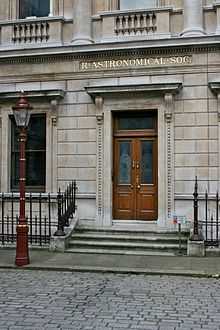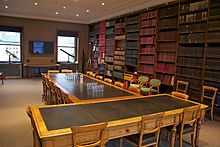Royal Astronomical Society
 Entrance to the Royal Astronomical Society at Burlington House, London | |
| Abbreviation | RAS |
|---|---|
| Motto |
Latin: Quicquid nitet notandum (Whatever shines should be observed) |
| Formation | March 10, 1820 |
| Type | NGO, learned society |
| Legal status | Registered charity |
| Purpose | Promote the sciences of astronomy & geophysics |
Professional title | FRAS |
| Headquarters | Burlington House |
| Location | |
| Coordinates | 51°30′32″N 0°8′22″W / 51.50889°N 0.13944°W |
President | Martin Barstow |
| Website |
www |
Formerly called | Astronomical Society of London |
The Royal Astronomical Society (RAS) is a learned society that began as the Astronomical Society of London in 1820 to support astronomical research (mainly carried on at the time by 'gentleman astronomers' rather than professionals). It became the Royal Astronomical Society in 1831 on receiving its Royal Charter from William IV. A Supplemental Charter in 1915 opened up the fellowship to women. It is the UK adhering organisation to the International Astronomical Union and a member of the Science Council, and encourages and promotes the study of astronomy, solar-system science, geophysics and closely related branches of science.[1] Meetings are held in Burlington House, in Piccadilly, London and across the United Kingdom (UK). They are involved in the production of astronomical journals and periodicals. The society has over 3000 members,[1] around a third of whom live outside the UK. In addition, those members of the public who have an interest in astronomy and geophysics and wish to support the work of the society may become Friends of the RAS.
Publications
One of the major activities of the RAS is publishing refereed journals. It publishes two primary research journals, the Monthly Notices of the Royal Astronomical Society in astronomy and (in association with the Deutsche Geophysikalische Gesellschaft) the Geophysical Journal International in geophysics. It also publishes the magazine A&G which includes reviews and other articles of wide scientific interest in a 'glossy' format. The full list of journals published (both currently and historically) by the RAS, with abbreviations as used for the NASA ADS bibliographic codes is:
- Memoirs of the Royal Astronomical Society (MmRAS): 1822–1977[2]
- Monthly Notices of the Royal Astronomical Society (MNRAS): Since 1827
- Geophysical Supplement to Monthly Notices (MNRAS): 1922–1957
- Geophysical Journal (GeoJ): 1958–1988
- Geophysical Journal International (GeoJI): Since 1989 (volume numbering continues from GeoJ)
- Quarterly Journal of the Royal Astronomical Society (QJRAS): 1960–1996
- Astronomy & Geophysics (A&G): Since 1997 (volume numbering continues from QJRAS)
Fellowship
Members of the RAS are styled fellows, and may use the postnominals FRAS.[note 1] Fellowship is open to anyone over the age of 18 who is considered acceptable to the society. As a result of the society's foundation in a time before there were many professional astronomers, no formal qualifications are required. However, around three quarters of fellows are professional astronomers or geophysicists. The society acts as the professional body for astronomers and geophysicists in the UK and fellows may apply for the Science Council's Chartered Scientist status through the society. The fellowship passed 3,000 in 2003.
Friends of the Royal Astronomical Society
In 2009 an initiative was launched for those with an interest in astronomy and geophysics but without professional qualifications or specialist knowledge in the subject. Such people may join the Friends of the RAS, which offers popular talks, visits and social events.
Meetings
The Society organises regular meetings. Ordinary meetings featuring lectures about research topics in astronomy and geophysics are normally held in Burlington House in London on the second Friday of every month from October through to May. Reports of the meetings appear in The Observatory magazine.[3]
Scientific discussion meetings about particular research topics are held on the day of the ordinary meetings. These allow several speakers to present new research results and experts to present reviews of scientific fields. Discussion meetings on two different topics within astronomy and geophysics frequently take place in parallel at different locations within Burlington House.
The Society occasionally hosts meetings in other parts of the United Kingdom, often in collaboration with other scientific societies and universities.
The Society also sponsors the National Astronomy Meeting, a week-long general conference of professional astronomers, normally held each spring at a university campus in the United Kingdom.
The Society holds occasional lunchtime public lectures in Central London aimed at a general, non-specialist, audience.[4]
Library
The Royal Astronomical Society has a more comprehensive collection of books and journals in astronomy and geophysics than the libraries of most universities and research institutions. The library receives some 300 current periodicals in astronomy and geophysics and contains more than 10,000 books from popular level to conference proceedings. Its collection of astronomical rare books is second only to that of the Royal Observatory in Edinburgh in the UK. The RAS library is a major resource not just for the society but also the wider community of astronomers, geophysicists, and historians.[5]
Education
The society promotes astronomy to members of the general public through their outreach pages for students, teachers, the public and media researchers. The RAS has an advisory role in relation to UK public examinations, such as GCSEs and A Levels.
Associated groups
The RAS sponsors topical groups, many of them in interdisciplinary areas where the group is jointly sponsored by another learned society or professional body:
- The Astrobiology Society of Britain (with the NASA Astrobiology Institute)
- The Astroparticle Physics Group (with the Institute of Physics)
- The Astrophysical Chemistry Group (with the Royal Society of Chemistry)
- The British Geophysical Association (with the Geological Society of London)
- The Magnetosphere Ionosphere and Solar-Terrestrial group (generally known by the acronym MIST)
- The UK Planetary Forum
- The UK Solar Physics group
Presidents

The first person to hold the title of President of the Royal Astronomical Society was William Herschel, though he never chaired a meeting, and since then the post has been held by many distinguished astronomers. The post has generally had a term of office of two years, but some holders resigned after one year e.g. due to poor health. Francis Baily and George Airy were elected a record of four times each. Baily's eight years in the role are a record (Airy served for seven). Since 1876 no-one has served for more than two years in total.
The current president is Martin Barstow, who was elected for the period 2014-16.[6]
Awards and prizes

The highest award of the Royal Astronomical Society is its Gold Medal, which can be awarded for any purpose but most frequently recognises extraordinary lifetime achievement.[7] Among the recipients best known to the general public are Albert Einstein in 1926, and Stephen Hawking in 1985.
Other awards include the Eddington Medal, the Herschel Medal, the Chapman Medal, the Price Medal and the Jackson-Gwilt Medal. Lectureships include the Harold Jeffreys Lectureship in geophysics, the George Darwin Lectureship in astronomy, and the Gerald Whitrow Lectureship in cosmology.
Other activities

The society occupies premises at Burlington House, London, where a library and meeting rooms are available to fellows and other interested parties. The society represents the interests of astronomy and geophysics to UK national and regional, and European government and related bodies, and maintains a press office, through which it keeps the media and the public at large informed of developments in these sciences. The society allocates grants to worthy causes in astronomy and geophysics, and assists in the management of the Paneth Trust [8]
See also
- Gold Medal of the Royal Astronomical Society
- Monthly Notices of the Royal Astronomical Society
- National Astronomy Week (NAW)
- List of astronomical societies
Notes & references
Notes
- ↑ Not to be confused with Fellows of the Royal Asiatic Society who use the same postnominals
References
- ↑ 1.0 1.1 RAS Website "About the RAS" page;
- ↑ Tayler, Roger (October 1977). "Editorial: Memoirs of the Royal Astronomical Society". Monthly Notices of the Royal Astronomical Society 181 (1): i. Retrieved 21 December 2012.
- ↑ "RAS Meetings". Royal Astronomical Society. Retrieved 14 May 2013.
- ↑ "RAS Public Lectures". Royal Astronomical Society. Retrieved 14 May 2013.
- ↑ RAS Website "RAS Library and archives;
- ↑ Smith, Keith (10 May 2013). "Election results: new President and Council". Royal Astronomical Society. Retrieved 13 April 2015.
Prof. Barstow will serve for one year as President Elect before succeeding the current President, Prof. David Southwood, in May 2014.
- ↑ "Winners of the 2015 awards, medals and prizes - full details". 9 January 2015. Retrieved 9 January 2015.
- ↑ RAS Website "Grants for Studies in Astronomy and Geophysics"
External links
| Wikimedia Commons has media related to Royal Astronomical Society. |
| Wikisource has original works on the topic: Royal Astronomical Society |
- The Royal Astronomical Society
- List of Gold Medal recipients
- Astronomy and Geophysics
- Geophysical Journal International
- Monthly Notices of the Royal Astronomical Society
- The Astrobiology Society of Britain
- The Astrophysical Chemistry Group
- The British Geophysical Association
- Magnetosphere Ionosphere and Solar-Terrestrial
- UK Planetary Forum
- UK Solar Physics
| ||||||||||||||||||||||||||||||||||||||||||
| ||||||||||||||||||